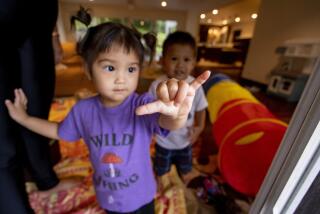Dennis Kamakahi dies at 61; guitarist was ‘ambassador of aloha’
Dennis Kamakahi, a prolific songwriter and master of slack key guitar whose music helped propel a renaissance of traditional Hawaiian culture in the 1970s and 1980s, died of lung cancer Monday in Honolulu. He was 61.
His death was confirmed by his close friend, George Kahumoku Jr.
Kamakahi wrote more than 500 songs, including many that have become standards. With his son, David, he performed on the soundtracks of Disney’s animated “Lilo & Stitch 2” and “The Descendants,” the 2011 film starring George Clooney that was said to be the first Hollywood movie scored exclusively with Hawaiian music.
------------
FOR THE RECORD:
Dennis Kamakahi: An obituary in the May 3 LATExtra section on Hawaiian slack-key guitarist and composer Dennis Kamakahi misspelled the Hawaiian term for elders as “kapuna.” It is “kupuna.”
------------
Known particularly for soulful compositions inspired by nature, Kamakahi was “probably Hawaii’s greatest songwriter since Queen Lili’uokalani,” the last regent of Hawaii who was revered for her contributions to the traditional Hawaiian songbook, said Kahumoku, also a noted singer-songwriter.
“He wrote about the simple things in life ... love songs, songs about our chiefs, songs about our winds, our waterfalls, and those dear to us,” Kahumoku said. “Hula dancers around the world dance to his songs.”
“The Descendants” soundtrack is credited with stirring mainstream interest in slack key guitar, an acoustic guitar tradition distinguished by its open tunings and finger picking. Said to have been developed in the early 1800s by Hawaiian cowboys who learned the style from Mexican vaqueros, it was revived in the 1960s, in large part due to the popularity of Gabby Pahinui, a venerated guitarist and singer with the group Sons of Hawaii.
In 1973, when Pahinui left the band, Kamakahi, then only 20, was asked to take his place. With the encouragement of other band members, he became a fluent interpreter and composer of Hawaiian music, producing a number of classics, including “Wahine ‘Ilikea,” “Koke’e” and “Ka ‘Opae.” He remained with the group for two decades, until the early 1990s, when he began to focus on a solo career.
His best-known song may be “Pua Hone,” which means honey flower in Hawaiian. A love song to his wife, Robin, it was inspired, oddly enough, by a visit to McNeil Island Corrections Center, a state prison in Washington, when he was 19.
“He was playing for Hawaiian prisoners on McNeil Island,” Kahumoku recalled. “While he was there he heard the clanging of the prison door and he said, ‘Man, I better get my act together’ and wrote that song for his wife.”
Kamakahi performed and gave slack key workshops throughout the United States and in Canada. He was twice featured at the Southern California Slack Key Festival, in 2008 and 2013.
“Dennis was always so generous and loving about sharing his music and mana’o (knowledge, insight) with everyone he came into contact with, and once he started it was sometimes hard to get him to stop,” said Mitchell Chang, who produces the Southern California Slack Key Festival. “But people would listen to every word, every story, in rapt attention. To me, he was nothing short of a cultural ambassador, definitely an ambassador of aloha.”
Born in Honolulu on March 31, 1953, Kamakahi grew up in a family immersed in Hawaii’s traditional music. He picked up the trombone from his father, who played the instrument in the Royal Hawaiian Band, and studied music theory and orchestration at Oahu’s Leeward Community College. But it was his grandfather and other kapuna, or elders, who schooled him in slack key guitar.
“You watch the kapuna, then go and try to do the same thing,” Kamakahi said in a biography for Dancing Cat Records, the label founded by pianist George Winston that promotes slack key music. “You come back, they correct you, and you experiment some more. After you do that a few times, you come back with something to share with whoever is teaching you. It’s a great form of respect for the teacher and it builds more confidence in the student.”
His teachers included Mary Kawena Pukui, a Hawaiian composer, dancer and scholar who co-authored the definitive Hawaiian-English Dictionary.
Kamakahi “wrote in a very old style of poetry, a lost art form of the ali’i, or royalty, and played a key role in helping keep the Hawaiian language alive,” Chang said.
An ordained minister, Kamakahi recorded extensively, included seven albums with Sons of Hawaii. He performed on three Grammy-winning compilation albums: “Legends of Hawaiian Slack Key Guitar” (2006), “Treasures of Hawaiian Slack Key Guitar” (2007), and “Masters of Hawaiian Slack Key Guitar” (2009).
His other albums include “Ohana” and “The Gift of Music — From Father to Son,” both of which also feature his son David, a gifted ukulele player.
His survivors include his wife of 42 years, Robin; three children and two grandchildren.
More to Read
Start your day right
Sign up for Essential California for the L.A. Times biggest news, features and recommendations in your inbox six days a week.
You may occasionally receive promotional content from the Los Angeles Times.







